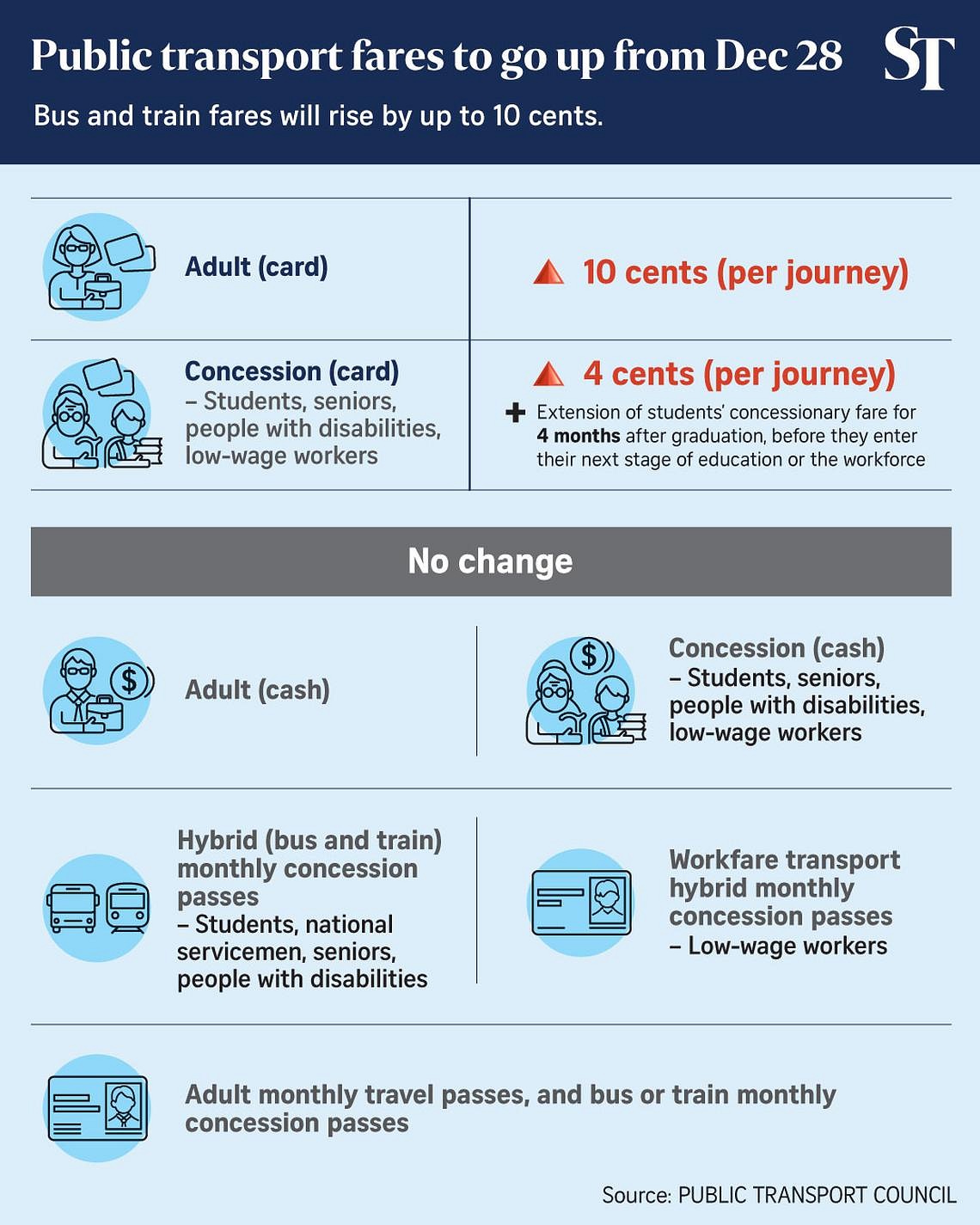SINGAPORE – The gap between public transport fare revenue and the cost of providing bus and MRT services has narrowed slightly in the 2024 fare review exercise, as the Government is set to fork out $50 million less in subsidies than in the previous year to keep the system running.
The Government is providing an extra $250 million in subsidies to cover the funding gap in 2024, less than the $300 million in additional subsidies for the 2023 exercise.
The job of the Public Transport Council (PTC) is to ensure that fares remain affordable on the one hand, while closing the gap between fare revenue and the cost of running services.
This has been made more difficult in recent times, with factors such as inflation and wage growth making the operation of the public transport system increasingly costly.
PTC works out the cost to run services by looking at, among other things, year-on-year changes in inflation, wage costs, and diesel and electricity prices, and how much fare revenue is needed to foot that bill.
However, for several years since the 2020 exercise, the council has held back the maximum allowable fare hike to keep prices affordable. In 2020, there was a freeze on fares, and a 4.4 per cent hike was deferred to the next review in 2021 to help the public cope with the impact of the Covid-19 pandemic.
While this rollover was cleared in the 2021 exercise, PTC had to defer part of the allowable fare hikes again in 2022 and 2023.
In the 2022 exercise, a 10.6 per cent hike – sparked in part by a year-on-year surge in energy costs – was rolled over to 2023.
The deferred increase persisted in 2023, when PTC deferred a 15.6 per cent hike till 2024 – the highest rollover on record.
Cost increases have since moderated. PTC said energy prices came down in 2023, helping to moderate the fare adjustment for 2024.
In 2024, the council allowed fares to rise by 6 per cent. This was less than a third of the allowable increase of 18.9 per cent, and the remaining hike of 12.9 per cent will be rolled over to future exercises.
This was similar to the approach it took in the 2023 exercise, where slightly under a third of the allowable increase – 7 per cent out of 22.6 per cent – was granted.
“As much as we can, we want to keep the financial impact of fare adjustments manageable for commuters,” said PTC chairwoman Janet Ang at a press conference on Sept 9 to announce the fare changes.

PTC was asked when it expects the deferred hike to be cleared.
Ms Ang said: “Definitely we must give back to the system, but as to how much we can include in each year’s fare adjustment, we (will look) at the current situation and make a decision at that point in time.
“You and I know that energy costs, no doubt, have stabilised. But it is at a new normal... I don’t think anybody is going to envisage that there is going to be a big fall-off. But never say never.”
As far as PTC’s public comments go, it appears likely that the deferred increases would be spread out for more years to come.
PTC chief executive Leow Yew Chin said there is no target to clear the deferred fare increase by 2027, which is the period during which the current fare formula will apply.
A new formula will be set from 2028. The formula is reviewed every five years.
As fares continued to climb in recent years, PTC has made moves to nudge heavy public transport users to take up monthly travel passes to cap their expenses.
In 2023, prices of monthly concession passes were lowered by up to 10 per cent, and a new concession pass for low-wage workers was introduced.
While adult card fares will rise by 10 cents per journey from Dec 28, prices of the passes have remained unchanged.
This is welcome news for those concerned about the rising cost of living.
Data from PTC suggests that more users are seeing the value of such passes, which allow unlimited travel on public transport, except on express and premium bus services.
Monthly sales of adult passes, for example, rose from 9,800 in 2023 to 12,500 in 2024.
Sales of monthly concession passes for seniors climbed about 57 per cent from 12,900 a month in 2023 to 20,200 in 2024.
From Dec 28, the adult card fare for a journey from Yishun in the north to City Hall in central Singapore will cost $2.10.
An adult monthly travel pass costs $128, which comes to just over $4 a day. So a passenger who makes more than two journeys daily across the island would enjoy savings.
This is broadly similar for seniors who use monthly passes, which cost $58, or just under $2 a day. Senior card fares are capped at $1.03 per journey.
The 2024 fare adjustment will result in an extra $132 million in revenue, with SMRT Trains getting $39.9 million and SBS Transit Rail receiving $20.3 million.
The remaining $71.8 million collected by the Land Transport Authority in the form of bus revenues and takings from the Thomson-East Coast MRT Line will fund the cost of operations, including payment of service fees to the operators.
The Ministry of Transport told The Straits Times that the average daily public transport ridership in the first half of 2024 is estimated to be about 97 per cent of levels seen in the same period in 2019, before the pandemic.
Factors like rising costs and ridership still lingering below pre-pandemic levels are not likely to disappear soon. And fewer people using public transport will translate into lower fare revenue.
The MRT network is expected to grow in the coming years, with developments such as the completion of the final stages of the Thomson-East Coast and Circle lines, and the new Jurong Region and Cross Island lines.
The enlarged network could lead to increased costs to keep a larger network shipshape, even as ridership is also set to rise.
With public transport likely to cost even more to run in future, PTC will have to continue striking a delicate balance between clearing the deferred fare hikes and not raising fares too much and too quickly such that they become unbearable for users.


